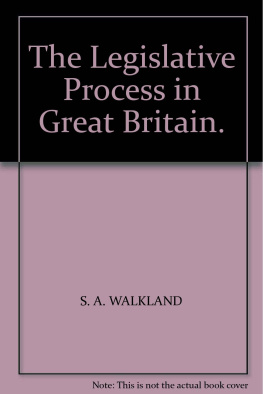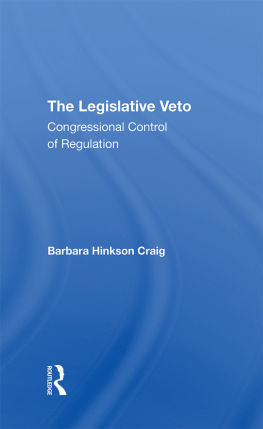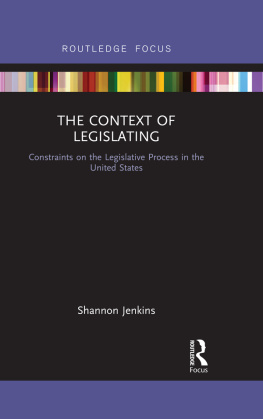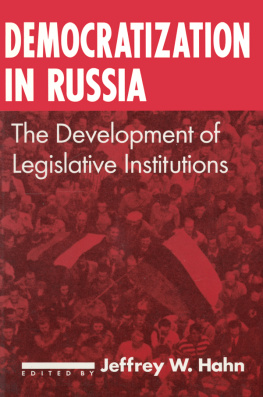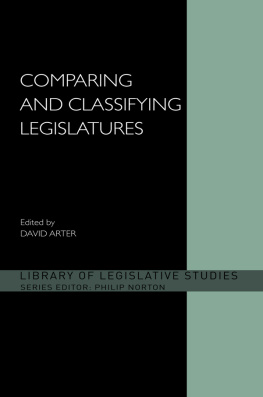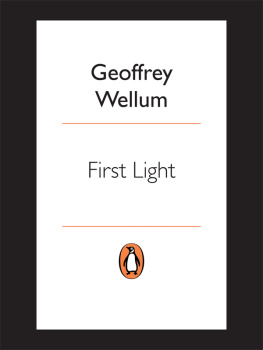Studies in Economics and Political Science
Volume 11
The Legislative Process in Great Britain
First published in 1968 by George Allen & Unwin Ltd
This edition first published in 2022
by Routledge
2 Park Square, Milton Park, Abingdon, Oxon OX14 4RN
and by Routledge
605 Third Avenue, New York, NY 10158
Routledge is an imprint of the Taylor & Francis Group, an informa business
1968 George Allen & Unwin Ltd
All rights reserved. No part of this book may be reprinted or reproduced or utilised in any form or by any electronic, mechanical, or other means, now known or hereafter invented, including photocopying and recording, or in any information storage or retrieval system, without permission in writing from the publishers.
Trademark notice: Product or corporate names may be trademarks or registered trademarks, and are used only for identification and explanation without intent to infringe.
British Library Cataloguing in Publication Data
A catalogue record for this book is available from the British Library
ISBN: 978-1-03-212459-9 (Set)
ISBN: 978-1-00-322951-3 (Set) (ebk)
ISBN: 978-1-03-213011-8 (Volume 11) (hbk)
ISBN: 978-1-03-213019-4 (Volume 11) (pbk)
ISBN: 978-1-00-322727-4 (Volume 11) (ebk)
DOI: 10.4324/9781003227274
Publishers Note
The publisher has gone to great lengths to ensure the quality of this reprint but points out that some imperfections in the original copies may be apparent.
Disclaimer
The publisher has made every effort to trace copyright holders and would welcome correspondence from those they have been unable to trace.
The Legislative Process in Great Britain
S. A. Walkland
Department of Political Theory and Institutions
University of Sheffield
FIRST PUBLISHED IN 1968
SECOND IMPRESSION 1969
This book is copyright under the Berne Convention. Apart from any fair dealing for the purpose of private study, research, criticism or review, as permitted under the Copyright Acty 1956, no portion may be reproduced by any process without written permission. Enquiries should be addressed to the publisher.
George Allen and Unwin Ltd., 1968
SBN 04 320060 5 paperbound edition
SBN 04 320048 6 clothbound edition
printed in great britain
in 10 point Plantin type
by willmer brothers limited
birkenhead
Acknowledgements
The author is grateful to Dr Malcolm Anderson, of the University of Warwick, and to Professor Bernard Crick, of the University of Sheffield, for reading the manuscript and making many constructive suggestions. They have, of course, no responsibility for any errors or omissions which are still obvious.
Introduction
Studies of British government are peculiarly prone to be written in terms of formal constitutional notions associated with eighteenth-and nineteenth-century political developments. Concepts such as the legislative supremacy of Parliament, and the rule of law, useful in limited ways, still confuse students attempting to gain a balanced perspective of the workings of the modern British governmental system. In this short book the author has tried to look at one important process unhampered by received notions about British Parliamentary government, and to set out the major determinants of policymaking by legislative means. Much of the background for this study has been derived from the general analyses of British government and politics which have been made by such writers as Samuel Beer, Richard Rose and Harry Eckstein. The author owes a large debt to these authorities, and to a number of other scholars who have worked in this field. Wherever possible, full attribution has been made.
The book begins with an analysis of governmental activities in terms of the main procedures that are available in the governmental system for decision-making. In the authors view this is a much more revealing categorization than attempts to differentiate governmental activities by reference to the kinds of decision which result from them. When applied to the history of the legislative process, it reveals the different legislative procedures which at times have been dominant in Britain, and their relationship to particular stages in the political and administrative development of the country. Chapter I shows, briefly, how in the nineteenth century the procedures of Private Bill legislation gave way, because of changed administrative and political circumstances, to legislation by Public General Act, and how in this century subordinate legislation made by Government Departments has become the characteristic regulatory instrument of a society which has developed politically to the stage where it needs comparatively few major adjustments to its organization, but much in the way of minute and technical oversight of its activities.
Chapter II sets out broadly the sources of legislative policy in Britain. A developed society is characterized by a marked diffusion of the sources of political power. At the same time the British political executive is strong enough to be able to assert its own priorities, and legislative policy-making is explained in terms of the relationships which have emerged between pressure groups representing special interests, Government Departments and the Cabinet.
Chapters III and IV deal with a marked phenomenon in the process of legislationthe extent to which the Government consults at the preparatory stages of Bills and Statutory Instruments with interested and affected parties. Official and unofficial consultative procedures are now a widespread accompaniment to the legislative process, and the extent of the practice is explained by a deep-rooted belief in Britain that private parties should have opportunities of making their views known on decisions which affect them, and, especially, in the case of delegated legislation, by the need to make workable provisions in what are often very complex regulatory fields.
The preparatory stage of Bills and Statutory Instruments is now the main deliberative stage of legislation, carried on between Departments and interested groups. But the Cabinet, through its network of committees, has the decisive role in determining the final content, form and timing of legislative measures. Chapter V deals with the legislative structure of the Cabinet, and sets out the conventional relationships which have emerged between pressure groups, Departments and the Cabinet in the preparation of legislation.
Chapter VI deals with the Parliamentary stages of both primary and subordinate legislation. Although Parliament still spends more time discussing Bills and Statutory Instruments than in any other activity, legislation is not now effectively a Parliamentary function. Direct Parliamentary participation in legislation is restricted to attempts to engineer minor adjustments to the Governments plans, and the main purpose of the Parliamentary stages is to dissect and expose the Governments intentions and to clarify the consequences of them for the electorate. This is an important function of a representative assembly, the facilities for which could be considerably developed. The last chapter contains some discussion of recent proposals for Parliamentary reform which are directed towards this problem.
Inevitably, the coverage of a book as short as this has had to be restricted. There is nothing included on the annual financial legislation of the British Government. This, whilst showing some of the characteristics of the ordinary legislative process, is bound by special Parliamentary procedural rules which can only be dealt with adequately in an extended survey. Fortunately this has recently been supplied by Professor Gordon Reid, in his book


